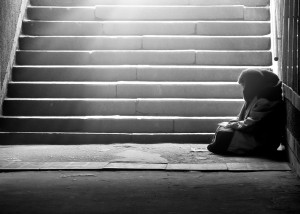Contributed by Jocelyn Breeland, Fairfax, VA
Warm-up Question
Would you make a good eyewitness? Why?
Taking Notice
How perceptive are you? In their book, The Invisible Gorilla, Christopher Chabris and Daniel Simons relate an experiment that sheds an interesting light on our ability to perceive events around us.
In the experiment, a man on a sidewalk in the middle of a college campus asks a pedestrian for directions to the library. While the pedestrian is giving directions, two other men approach carrying a door on their shoulders and, instead of walking around the first two men, they walk right between them, temporarily blocking the pedestrian’s view of the man to whom he was giving directions. At that moment, one of the men with the door switches places with the man who asked for directions, and resumes the conversation.
The pedestrian continues his directions, seemingly unaware of the change. In fact, although the original direction seeker and his replacement are wearing different clothes, differ in height by three inches, have different builds and noticeably different voices, nearly half of the subjects in the experiment failed to notice the switch.
This experiment highlights the phenomena of “change blindness.” We can miss even some pretty obvious changes in our environments when we aren’t expecting them. This is just one of many ways in which our perception of the world around us can differ from reality. At any moment, our expectations, our previous experiences, our focus or lack thereof can have a dramatic effect on how we experience the world around us.
See this short video http://youtu.be/FWSxSQsspiQ of the Door Study in action.
[Note to Leaders: More videos from the research can be found here: http://www.theinvisiblegorilla.com/videos.html The Monkey Business Illusion (under two minutes’ duration) could be especially interesting when paired with this week’s Gospel message. Consider presenting it to the group.]
Discussion Questions
- Why do you think the pedestrian in the experiment didn’t notice the change in questioners?
- Being able to focus completely on a task has its advantages. Are there disadvantages?
- Have you had an experience where your memory of an event is different from that of someone else who was also there? Why do you think this happens?
Scripture Texts (NRSV) for Sunday, May 22, 2011 (Fifth Sunday of Easter)
Acts 7:55-60
1 Peter 2:2-10
John 14:1-14
(Text links are to Oremus Bible Browser. Oremus Bible Browser is not affiliated with or supported by the Evangelical Lutheran Church in America. You can find the calendar of readings for Year C at Lectionary Readings.)
For lectionary humor and insight, check the weekly comic Agnus Day.
Gospel Reflection
 Today’s Gospel message brings to mind the words of the Cheshire Cat of Lewis Carroll’s Alice in Wonderland. He told Alice if she didn’t know where she was going, it didn’t matter which way she went.
Today’s Gospel message brings to mind the words of the Cheshire Cat of Lewis Carroll’s Alice in Wonderland. He told Alice if she didn’t know where she was going, it didn’t matter which way she went.
Jesus wants to make sure his followers understand where they’re going. The promise was not just new life after death, but rich, satisfying life with Jesus right now. Knowing Jesus had made this promise must have been a comfort to the disciples in the difficult times during their lives and ministry, and it is a comfort to us as well.
Like the disciples, we know our ultimate destination – a place in heaven with Jesus, where we know and are known perfectly. We even understand, in a general way, that the road which leads us there is the path of trusting God’s love and reflecting that love in a godly life. But the road takes us through some difficult territory, strewn with obstacles and distractions. It’s hard to be certain that each step we take is leading in the right direction. That’s why Jesus calls us to focus on him, on the example of his life and the assurance of his love. If we focus on Jesus, it’s easy to follow the plan that God has for our lives. Jesus really is the way, the truth and the life. He is all we need.
Discussion Questions
- How might your understanding of Jesus’ words be different from that of the disciples?
- In your own experience, how has Jesus been the way, the truth and the life?
- In verse 12, Jesus says “…and greater works than these he will do.” What does he mean?
- Is it possible to focus too much on Jesus in your life?
Activity Suggestion
One of the great works of Christian spirituality is John Bunyan’s The Pilgrim’s Progress. In Bunyan’s allegorical novel, Christian, an everyman character, makes his way from his home town, City of Destruction, to the Celestial City. Along the way he deals with various dangers, characters, and distractions such as Mr. Worldly Wiseman, the Slough of Despond, and Giant Despair. Draw your own map of the Christian journey, labeling the challenges which you see as most significant for someone in your context as a young adult. For example you might put in an encounter with “Miss Babbling Twitter”, representing the temptation to spend all your time on superficial things.
Closing Prayer
Heavenly Father, thank you for sending your son Jesus to show us the way. Help us to keep our eyes on him and to follow the path you have laid out for each of us according to your will. In Jesus’ name we pray. Amen.




